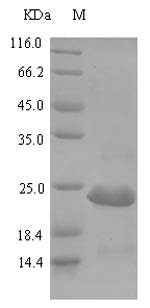E. coli Carbon storage regulator Recombinant Protein Product Attributes
Product Type: Recombinant Protein
Recombinant Carbon storage regulator based upon sequence from: E. coli
Host: QP7510 protein expressed in E. coli.
Tag: His-SUMO
Protein Construction: A DNA sequence encoding the Escherichia coli (strain K12 / DH10B) Carbon storage regulator, was expressed in the hosts and tags indicated. Please select your host/tag option, above.
Application Notes: Please contact us for application specific information for QP7510.
Bioactivity Data: Untested
Full Length? Full Length
Expression Region: Met1 – Tyr61
Amino Acid Sequence: MLILTRRVGE TLMIGDEVTV TVLGVKGNQV RIGVNAPKEV SVHREEIYQR IQAEKSQQSS Y
Purity: Greater than 90% as determined by SDS-PAGE.
Reconstitution Instructions:
Concentration of E. coli Carbon storage regulator Protein:
Endotoxin Levels: Not determined.
Buffer: Tris-based buffer, 50% glycerol
Storage Conditions: Store at -20C to -80C.
| Recombinant E. coli Carbon storage regulator Protein General Information | |
|---|---|
| Curated Database and Bioinformatic Data | |
| Gene Symbol | csrA |
| Entrez Gene ID | 32441215 |
| RefSeq Protein Accession(s) | WP_000906486.1 |
| RefSeq mRNA Accession(s) | NC_010473.1 |
| UniProt ID(s) | B1XCM4 |
| KEGG Gene ID(s) | ecd:ECDH10B_2864 |
| General Description of Recombinant E. coli Carbon storage regulator Protein. | |
| Affects glycogen biosynthesis, gluconeogenesis, cell size and surface properties. Regulates glycogen synthesis under both aerobic and anaerobic conditions. Seems to accelerate the degradation of glg gene transcripts, potentially through selective RNA binding. Acts to inhibit interaction between the LetD protein and the A subunit of DNA gyrase. Also required for motility and flagellum biosynthesis through the post-transcriptional activation of flhDC expression. This involves binding to and stabilization of the flhDC message by CsrA. | |
Limitations and Performance Guarantee
This is a life science research product (for Research Use Only). This product is guaranteed to work for a period of two years when stored at -70C or colder, and one year when aliquoted and stored at -20C.




There are no reviews yet.